高中英语人教版必修五Unit1 Great Scientists Warming up and Listenning 课件 22张PPT
文档属性
| 名称 | 高中英语人教版必修五Unit1 Great Scientists Warming up and Listenning 课件 22张PPT |
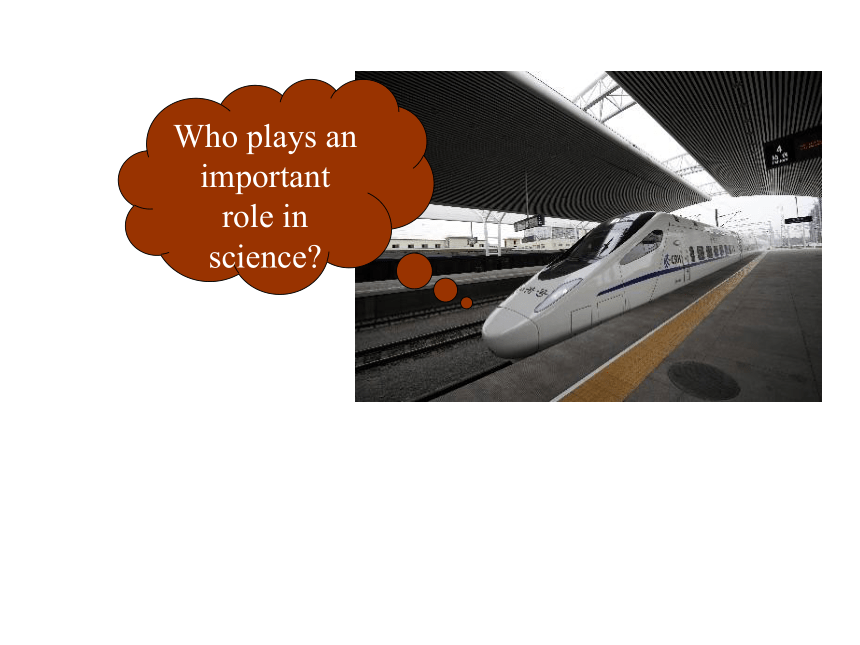
|
|
| 格式 | zip | ||
| 文件大小 | 1.7MB | ||
| 资源类型 | 教案 | ||
| 版本资源 | 人教版(新课程标准) | ||
| 科目 | 英语 | ||
| 更新时间 | 2021-12-09 23:55:23 | ||
图片预览



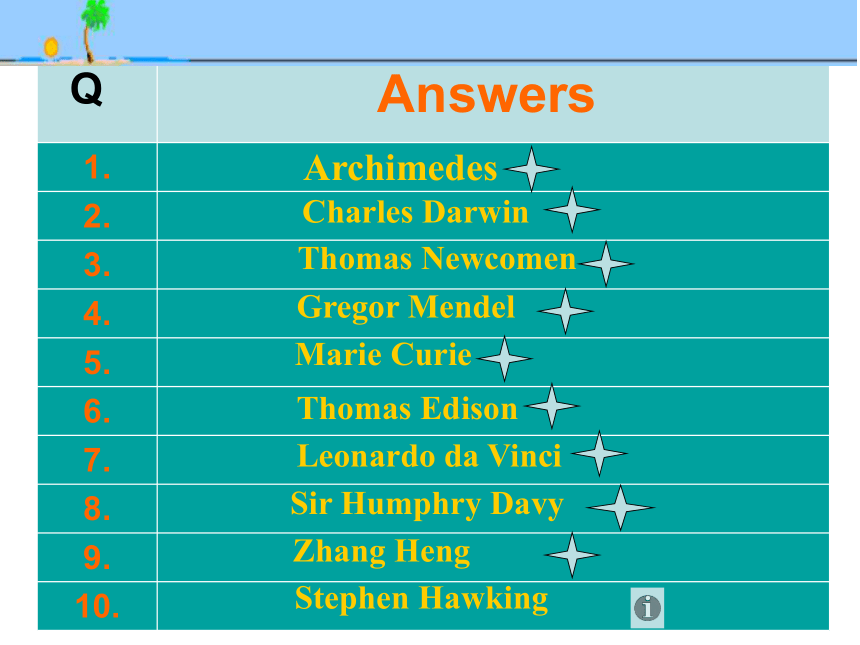
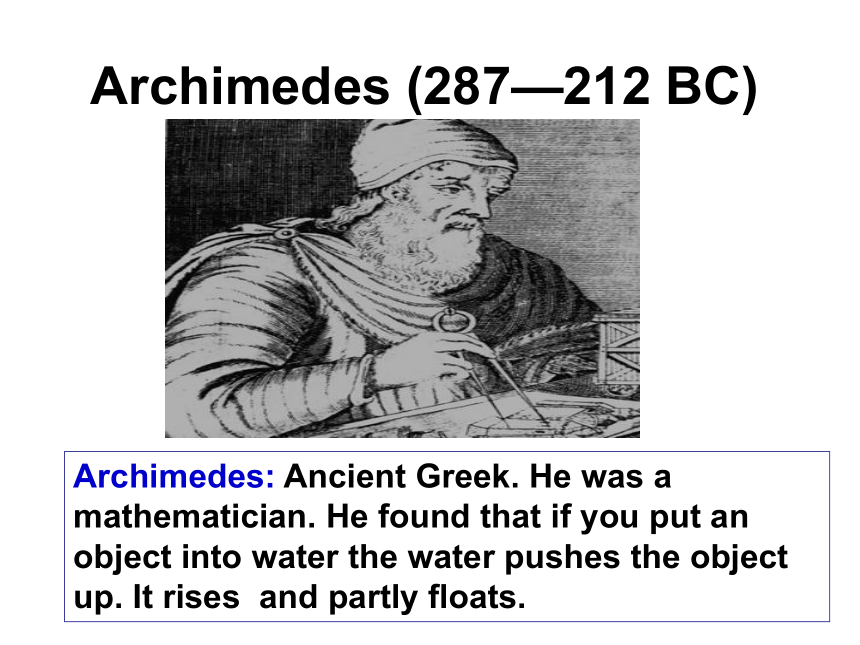
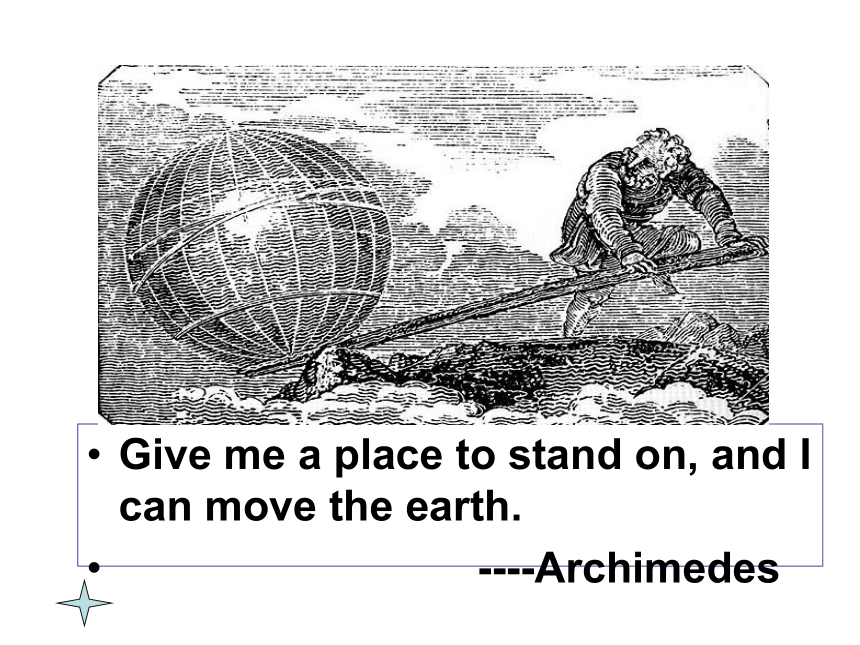
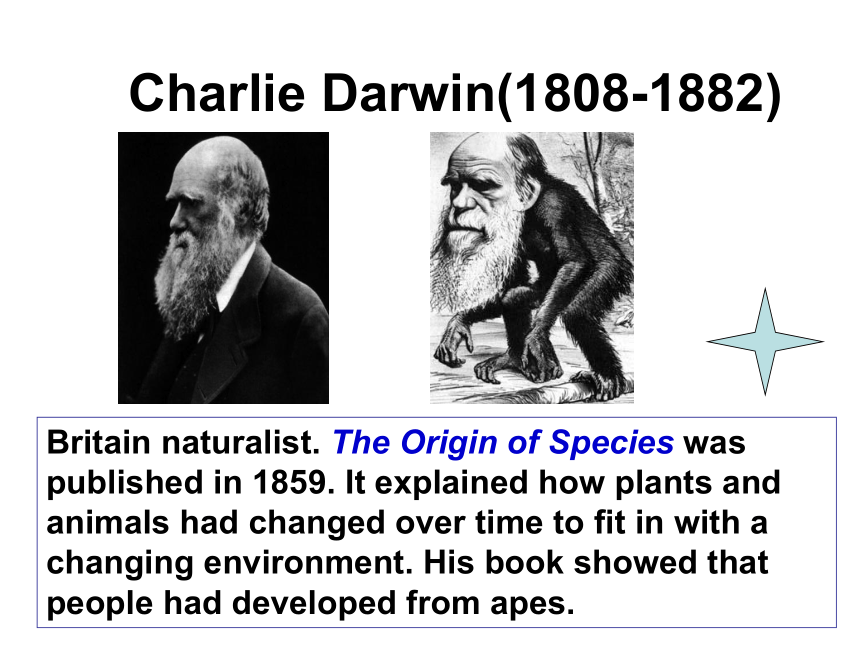
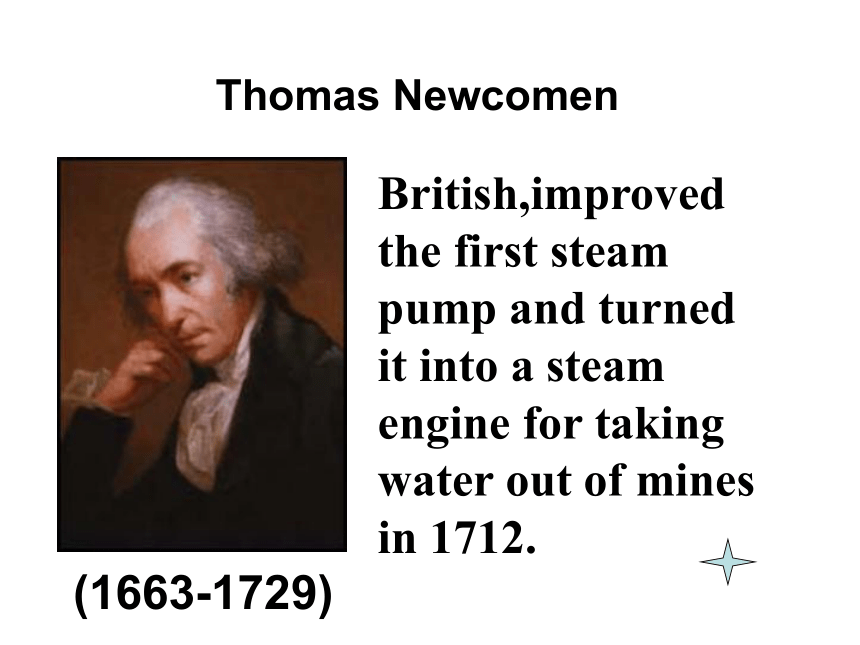

文档简介
(共22张PPT)
Who plays an important role in science
Do you know about great scientists
How many of them can you name
What other scientists
do you know
Do the quiz and see who knows the most.
Warming up
Q Answers
1.
2.
3.
4.
5.
6.
7.
8.
9.
10.
Archimedes
Charles Darwin
Thomas Newcomen
Gregor Mendel
Marie Curie
Thomas Edison
Leonardo da Vinci
Sir Humphry Davy
Zhang Heng
Stephen Hawking
Archimedes (287—212 BC)
Archimedes: Ancient Greek. He was a mathematician. He found that if you put an object into water the water pushes the object up. It rises and partly floats.
Give me a place to stand on, and I can move the earth.
----Archimedes
Charlie Darwin(1808-1882)
Britain naturalist. The Origin of Species was published in 1859. It explained how plants and animals had changed over time to fit in with a changing environment. His book showed that people had developed from apes.
British,improved the first steam pump and turned it into a steam engine for taking water out of mines in 1712.
(1663-1729)
Thomas Newcomen
Gregor Mendel(1822—1884)
Gregor Mendel. The father of genetic. He grew pea plants and developed ideas on inherited characteristics. Between 1856—1863 he grew 28,000 pea plants. He examined seven kinds of seed and plant characteristics and developed some laws of inheritance遗传.
Marie Curie (1867-1934) was born in Poland, moved to Paris and studied chemistry and physics there. She married Pierre Curie and together they studied radioactive materials and discovered radium. In 1911 she received the Nobel Prize in Chemistry. Her death in 1934 was almost certainly due to radiation in her work.
Thomas Edison(1847----1931)
He was already an inventor of other electrical devices (phonograph, electric light bulb) when in 1882 he designed a system for providing New York with electricity from a central power station. This was a tremendous achievement, which had previously been thought impossible.
Leonardo da Vinci(1452-----1519)
He was a famous Italian artist whose skill for showing human skin tones made his paintings seem to come alive. He used to study dead people in order to make his paintings as accurate as possible. One of his famous paintings includes the “The Last Supper”.
Sir Humphry Davy
(1778—1829)
British. He did research into different gases and discovered the medical value of nitrous oxide (laughing gas) as an anaesthetic.(麻醉药) In 1815 he developed a safety lamp for miners.
Zhang Heng ,Chinese( 78-----139)
He invented the first seismograph to indicate in the direction of an earthquake. It was in the shape of a cylinder with eight dragonheads round the top, each with a ball in its mouth. Around the bottom were eight frogs directly under a dragon’s head. When an earthquake occurred, a ball fell out of the dragon’s mouth, making a noise.
Stephen Hawking,British(1942--- )
He has worked in astronomy and studied black holes in space. He has shown that black holes do not only absorb everything around them but, from time to time, throw out matter as well. This may mark the beginning of new galaxies. This is an advance on the old theory which said that black holes “eat” everything they come across.
Brainstorming
made a great contribution
made great achievements
succeeded in their scientific career
overcome many difficulties
as a scientist , what qualities should they equip themselves with
Adj: ……….
Thanks to those scientists, not only do we live a comfortable life now, but also we can learn more about ourselves and our surroundings. In addition ,we may uncover some unknown fields with the help of those great minds.
Workbook: listening
Robert Briggs is very interested in biology and especially in the study of plants. Today he is telling his friends Zhang Wei some exciting news.
1.Before we listen to the tape discuss with your partner how you would find out the name of a flower.
2. Which of the following statements describes what this listening passage about
This is about a man who wants to name a flower.
This is about a man who finds a flower and wants to own it.
This is about a man who finds a flower and wants to know if it is a new species of flower.
Review the lesson we had today.
Preview the passage on page 2
Who plays an important role in science
Do you know about great scientists
How many of them can you name
What other scientists
do you know
Do the quiz and see who knows the most.
Warming up
Q Answers
1.
2.
3.
4.
5.
6.
7.
8.
9.
10.
Archimedes
Charles Darwin
Thomas Newcomen
Gregor Mendel
Marie Curie
Thomas Edison
Leonardo da Vinci
Sir Humphry Davy
Zhang Heng
Stephen Hawking
Archimedes (287—212 BC)
Archimedes: Ancient Greek. He was a mathematician. He found that if you put an object into water the water pushes the object up. It rises and partly floats.
Give me a place to stand on, and I can move the earth.
----Archimedes
Charlie Darwin(1808-1882)
Britain naturalist. The Origin of Species was published in 1859. It explained how plants and animals had changed over time to fit in with a changing environment. His book showed that people had developed from apes.
British,improved the first steam pump and turned it into a steam engine for taking water out of mines in 1712.
(1663-1729)
Thomas Newcomen
Gregor Mendel(1822—1884)
Gregor Mendel. The father of genetic. He grew pea plants and developed ideas on inherited characteristics. Between 1856—1863 he grew 28,000 pea plants. He examined seven kinds of seed and plant characteristics and developed some laws of inheritance遗传.
Marie Curie (1867-1934) was born in Poland, moved to Paris and studied chemistry and physics there. She married Pierre Curie and together they studied radioactive materials and discovered radium. In 1911 she received the Nobel Prize in Chemistry. Her death in 1934 was almost certainly due to radiation in her work.
Thomas Edison(1847----1931)
He was already an inventor of other electrical devices (phonograph, electric light bulb) when in 1882 he designed a system for providing New York with electricity from a central power station. This was a tremendous achievement, which had previously been thought impossible.
Leonardo da Vinci(1452-----1519)
He was a famous Italian artist whose skill for showing human skin tones made his paintings seem to come alive. He used to study dead people in order to make his paintings as accurate as possible. One of his famous paintings includes the “The Last Supper”.
Sir Humphry Davy
(1778—1829)
British. He did research into different gases and discovered the medical value of nitrous oxide (laughing gas) as an anaesthetic.(麻醉药) In 1815 he developed a safety lamp for miners.
Zhang Heng ,Chinese( 78-----139)
He invented the first seismograph to indicate in the direction of an earthquake. It was in the shape of a cylinder with eight dragonheads round the top, each with a ball in its mouth. Around the bottom were eight frogs directly under a dragon’s head. When an earthquake occurred, a ball fell out of the dragon’s mouth, making a noise.
Stephen Hawking,British(1942--- )
He has worked in astronomy and studied black holes in space. He has shown that black holes do not only absorb everything around them but, from time to time, throw out matter as well. This may mark the beginning of new galaxies. This is an advance on the old theory which said that black holes “eat” everything they come across.
Brainstorming
made a great contribution
made great achievements
succeeded in their scientific career
overcome many difficulties
as a scientist , what qualities should they equip themselves with
Adj: ……….
Thanks to those scientists, not only do we live a comfortable life now, but also we can learn more about ourselves and our surroundings. In addition ,we may uncover some unknown fields with the help of those great minds.
Workbook: listening
Robert Briggs is very interested in biology and especially in the study of plants. Today he is telling his friends Zhang Wei some exciting news.
1.Before we listen to the tape discuss with your partner how you would find out the name of a flower.
2. Which of the following statements describes what this listening passage about
This is about a man who wants to name a flower.
This is about a man who finds a flower and wants to own it.
This is about a man who finds a flower and wants to know if it is a new species of flower.
Review the lesson we had today.
Preview the passage on page 2
